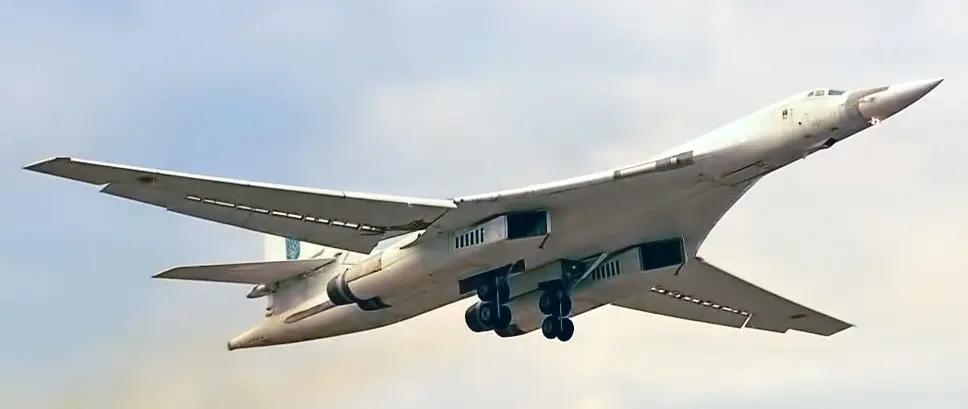
India’s strategic bid to lease Russia’s Tu-160M ‘White Swan’ bombers has rattled Pakistan and raised global eyebrows. (photo-wikipedia)
The White Swan That Shook Borders
In a bold move to elevate its strategic airpower, India initiated talks with Russia to lease up to eight Tu-160M Bomber ‘White Swan’ bombers supersonic giants capable of flying 12,000 kilometers without refueling and delivering 40 tonnes of payload. These aircraft, revered for their speed and stealth, were to be integrated with India’s BrahMos cruise missiles, creating a lethal combination unmatched in Asia.
The deal, modeled after India’s successful lease of the INS Chakra nuclear submarine, was more than a procurement, it was a statement. A signal to adversaries like Pakistan and China that India was ready to project power far beyond its borders. The Tu-160M’s ability to strike deep into enemy territory without crossing airspace made it a game-changer in strategic deterrence.
Pakistan, lacking any comparable bomber fleet, viewed the development with unease. Defense analysts warned that the BrahMos-equipped White Swan could neutralize key installations in minutes, shifting the balance of power. China, too, took note, as India’s move threatened to outpace its H-6K bomber capabilities.
But just as the ink was drying, the skies darkened. Russia’s war in Ukraine intensified, and the Kazan Aviation Plant, responsible for Tu-160M production faced crippling sanctions and drone strikes. Moscow’s priorities shifted inward, and the bombers once earmarked for India were redirected to bolster Russia’s own defenses.
Strategic Shockwaves and Diplomatic Dilemmas
The pause in the Tu-160M deal has triggered ripple effects across South Asia and beyond. For India, the delay is more than logistical, it’s a strategic setback. The Indian Air Force, while equipped with Su-30MKIs and Rafales, lacks true long-range strike capability. The White Swan was meant to fill that void, offering reach without dependence and strike without provocation.
Russia’s hesitation has also complicated India’s defense diplomacy. While New Delhi maintains strong ties with Moscow, it’s equally invested in partnerships with the U.S., France, Israel, and Japan. Acquiring high-profile Russian weaponry amid global sanctions risks diplomatic friction with Western allies.
Yet, the need remains urgent. India’s defense doctrine increasingly emphasizes self-reliance and strategic depth. The Tu-160M, with its unmatched specs, Mach 2 speed, stealth profile, and nuclear payload capacity, was central to that vision. Its integration with BrahMos would have created a platform capable of precision strikes across the Indo-Pacific, Middle East, and even Eastern Europe.
Pakistan’s anxiety is palpable. The mere prospect of India fielding such bombers has prompted calls for countermeasures and increased surveillance. Defense experts in Islamabad warn that the Tu-160M could render existing air defenses obsolete, forcing a costly arms race.
A Bomber Paused, A Doctrine Rewritten
As the deal stalls, India faces a strategic crossroads. Should it wait for Russia to resume production, or pivot to indigenous solutions and Western alternatives? The answer may lie in a hybrid approach, strengthening domestic programs like the AMCA stealth fighter while keeping the Tu-160M option alive.
Behind the scenes, negotiations continue. Indian officials remain hopeful that once Russia stabilizes its supply chains, the lease could be revived. The package, which includes training, technology transfer, and BrahMos integration, aligns perfectly with India’s “Make in India” initiative and long-term defense goals.
Meanwhile, global powers are watching. Washington, Paris, and Tel Aviv are closely monitoring India’s military purchases, aware that a deal like the Tu-160M could tip diplomatic scales. For India, the challenge is balancing ambition with pragmatism asserting its strategic autonomy without alienating key partners.
The skies may be quieter for now, but the strategic calculus is shifting. Whether the White Swan takes flight or remains grounded, its impact on regional security and global diplomacy is undeniable.
Stay updated with the latest news on Rapido Updates. Keep yourself updated with The World, India News, Entertainment, Market, Automobile, Gadgets, Sports, and many more
Also read – Agni-5 Reforged: India’s Devastating Bunker Buster Missile Signals Strategic Shockwave